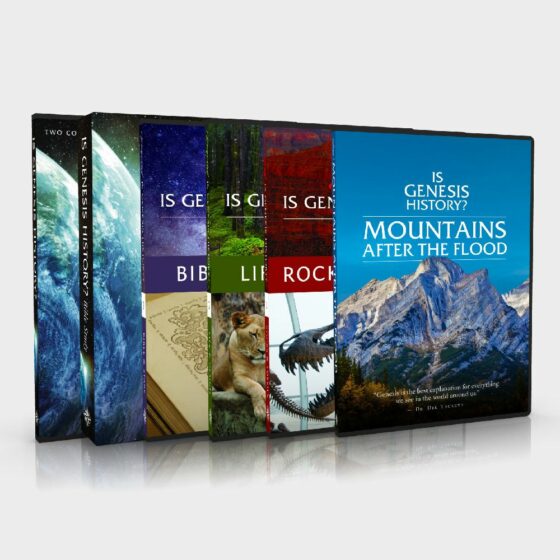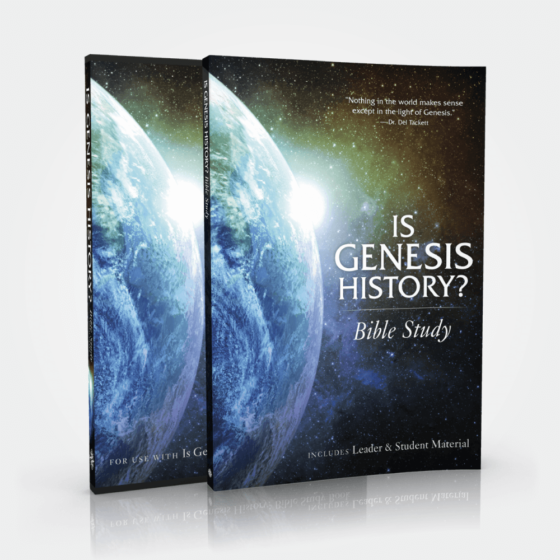This is the fifth of five posts dealing with the question of ‘The Age of the Earth and the Bible.’ It is taken from the Is Genesis History? Bible Study available in our store. Read the first post here, the second post here, the third post here, and the fourth post here.
Today, the connection between history and doctrine is lost on many Christians. It was lost on many intelligent men of the 19th-century, most of whom did not realize how their successive compromises ended up sacrificing the doctrinal foundation of the gospel.
There still remain Christians who follow a form of Cuvier’s ‘progressive creation’ or a form of Asa Gray’s ‘theistic evolution.’ It is logical therefore that both groups must sacrifice basic Christian doctrines in order to maintain these views.
These Christians attempt to reside in a middle ground between the Biblical and conventional views of history. They borrow from both, but are consistent with neither.
Nigel Cameron accurately sums it up: “Men like [Hebraist] S.R. Driver…made very clear what the choice actually is: between accepting the Genesis narratives in an essentially ‘literal’ sense—as teaching what they plainly intend to teach— and rejecting them as teaching anything about the origin of the world. The middle ground, which evangelicals then as now desired to occupy, is untenable.”[1]
Why is it untenable?
Because the integrity of essential Christian doctrines rests on the Biblical view of events as presented in Genesis. Even though many Christians who occupy the middle ground are well-meaning, they cannot provide a positive structure of natural history that fits with the written record, not only in Genesis, but throughout the rest of the Bible.
The history of the 19th and 20th-centuries does not bode well for purveyors of these views.
The children of progressive creationists inevitably grow up to become theistic evolutionists; their children eventually become atheistic evolutionists. This is simply a pattern of history. When one generation begins questioning the historical accuracy of some parts of the Bible, the next generation follows this questioning to its logical conclusions.
The history of Western Europe and America is clear here: why should one believe in something that didn’t really happen?
The integrity of essential Christian doctrines rests on the Biblical view of events as presented in Genesis
It is a dangerous course when Christians start questioning historical events that form the foundation of their faith. Those who seek to replace the Biblical age of the earth with the conventional age are simply replacing Biblical history with a history intended to make the resurrection of Jesus impossible.
Paul, of course, understood this. It is why questions about the history of the earth are of central importance to him. As he reminds us, it is only when we start with the history recorded in Genesis as true history that we can begin to understand the true nature of our salvation. It is therefore fitting that we close this discussion with Paul’s words to the Corinthians:
“Now if Christ is proclaimed as raised from the dead, how can some of you say that there is no resurrection of the dead? But if there is no resurrection of the dead, then not even Christ has been raised. And if Christ has not been raised, then our preaching is in vain and your faith is in vain. We are even found to be misrepresenting God, because we testified about God that he raised Christ, whom he did not raise if it is true that the dead are not raised. For if the dead are not raised, not even Christ has been raised. And if Christ has not been raised, your faith is futile and you are still in your sins. Then those also who have fallen asleep in Christ have perished. If in Christ we have hope in this life only, we are of all people most to be pitied.”
“But in fact Christ has been raised from the dead, the firstfruits of those who have fallen asleep. For as by a man came death, by a man has come also the resurrection of the dead. For as in Adam all die, so also in Christ shall all be made alive. But each in his own order: Christ the firstfruits, then at his coming those who belong to Christ. Then comes the end, when he delivers the kingdom to God the Father after destroying every rule and every authority and power. For he must reign until he has put all his enemies under his feet. The last enemy to be destroyed is death. For ‘God has put all things in subjection under his feet.’ But when it says, ‘all things are put in subjection,’ it is plain that he is excepted who put all things in subjection under him. When all things are subjected to him, then the Son himself will also be subjected to him who put all things in subjection under him, that God may be all in all.” (1 Corinthians 15:12-28, ESV)
This material on ‘The Age of the Earth’ (and much more like it) is part of the Is Genesis History Bible Study. It explores what the Bible teaches on Creation, Adam and Eve, and the Flood in light of six key doctrines. Designed for churches, youth groups, and families, it can be used to go deeper into the Biblical issues related to the documentary film.
[1] Cameron, 83



